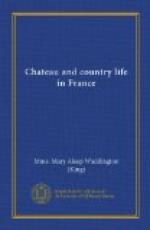I was really very much vexed, and told him I would talk it over with my son and see what we could do. The poor little cure was much disappointed, but begged me not to insist upon his presence.
A little later the school-master arrived, also very much embarrassed, saying practically the same thing—that he liked the cure very much. He never talked politics, nor interfered in any way with his parishioners. Whenever any one was ill or in trouble, he was always the first person to come forward and nurse and help. But he saw him very little. If I held to the cure being present at the Christmas tree, of course he could say nothing; but he would certainly be dismissed the next day. He was married—had nothing but his salary; it would be a terrible blow to him.
I was very much perplexed, particularly as the time was short and I couldn’t get hold of the mayor. So we called a family council—Henrietta and Francis were both at home—and decided that we must let our fete take place without the cure. The school-master was very grateful, and said he would take my letter to the post-office. I had to write to the cure to tell him what we had decided, and that he might go to Reims.
One of our great amusements in the winter was the hunting. We knew very well the two gentlemen, Comtes de B. and de L., who hunted the Villers-Cotterets forest, and often rode with them. It was beautiful riding country—stretches of grass alongside the hard highroad, where one could have a capital canter, the only difficulty being the quantity of broad, low ditches made for the water to run off. Once the horses knew them they took them quite easily in their stride, but they were a little awkward to manage at first. The riding was very different from the Roman Campagna, which was my only experience. There was very little to jump; long straight alleys, with sometimes a big tree across the road, occasionally ditches; nothing like the very stiff fences and stone walls one meets in the Campagna, or the slippery bits of earth (tufa) where the horses used to slide sometimes in the most uncomfortable way. One could gallop for miles in the Villers-Cotterets forest with a loose rein. It was disagreeable sometimes when we left the broad alleys and took little paths in and out of the trees. When the wood was thick and the branches low, I was always afraid one would knock me off the saddle or come into my eyes. Some of the meets were most picturesque; sometimes in the heart of the forest at a great carrefour, alleys stretching off in every direction, hemmed in by long straight lines of winter trees on each side, with a thick, high undergrowth of ferns, and a broad-leaved plant I didn’t know, which remained green almost all winter. It was pretty to see the people arriving from all sides, in every description of vehicle—breaks, dog-carts, victorias, farmer’s gigs—grooms with led horses, hunting men in green or red coats, making warm bits of colour in the rather severe landscape.




